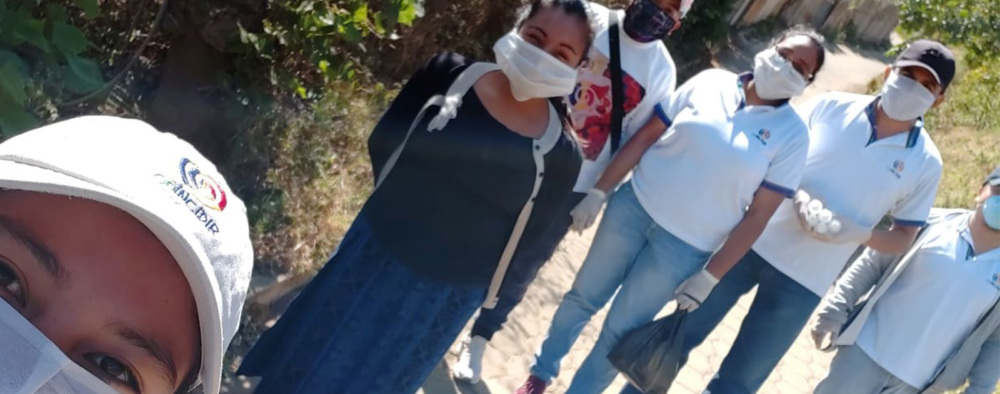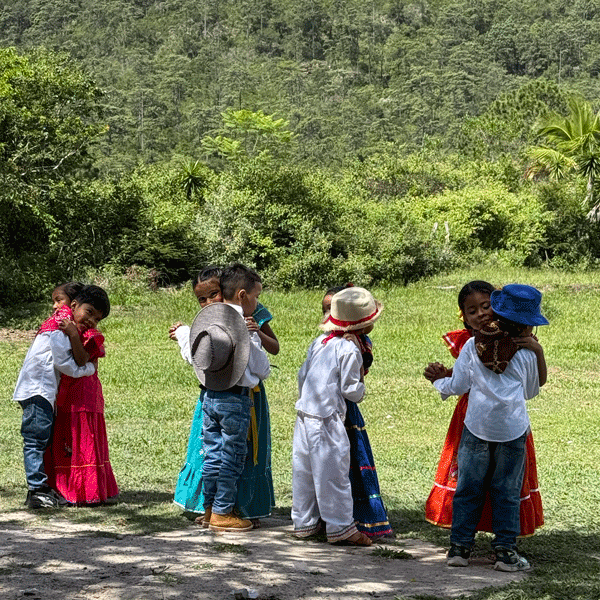
Educação
Educação, Justiça de gênero, Poder da juventude
Nota do editor: Esta publicação também está disponível em Espanhol.
Coincidir, um parceiro da GFC Empoderando Meninas Adolescentes iniciativa desde 2018, atua em duas áreas diferentes na Guatemala: no departamento ocidental de Chimaltenango e no departamento oriental de Jalapa. A situação em Jalapa antes da pandemia da COVID-19 já era difícil o suficiente. Localizada no Corredor Seco, uma região na Costa do Pacífico da América Central que se estende do sul do México ao Panamá e é propensa a secas severas, Jalapa é altamente afetada por esse fenômeno climático. Anos de pouca ou nenhuma chuva levaram à perda de plantações básicas e, por sua vez, a índices severos de desnutrição nas comunidades de Jalapa.
Quando a pandemia da COVID-19 atingiu, as medidas de contenção implementadas pelo governo para deter a disseminação do coronavírus atingiram essas comunidades de Jalapa com mais força, já que a maioria das pessoas são diaristas e dependem de suas rendas diárias para manter suas famílias alimentadas. Saul Interiano, Diretor Executivo da Coincidir, compartilhou que a proibição do transporte público fez com que 85% das adolescentes e jovens mulheres de Jalapa que participam dos programas da Coincidir perdessem seus empregos. A ONG sediada nos EUA Ação Contra a Fome determinou que, até o final de maio de 2020, o número de casos de desnutrição aguda em todo o país (15.000) excedeu o número total de casos relatados em todo o ano de 2019.
[image_caption caption=”Membros da equipe da Coincidir se preparam para entrar em uma comunidade para entregar suprimentos de higiene e alimentos. © Coincidir” float=”alignright”]
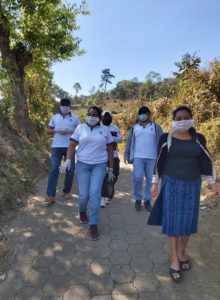 [/imagem_legenda]
[/imagem_legenda]
De acordo com Eyda e María José, duas funcionárias da Coincidir que trabalham em Jalapa, a organização delas é a única que foi autorizada a entrar nas comunidades para distribuir máscaras, álcool em gel, sabão e produtos alimentícios básicos, como arroz, feijão, milho e leite, para as famílias das crianças e jovens que participam de seus programas. Esse acesso se deve em grande parte a 20 meninas líderes de dez comunidades que, com o apoio da Coincidir, formaram uma unidade de coordenação conhecida como La Coordinadora. Eyda, de 20 anos, que fazia parte da La Coordinadora antes de ser contratada pela Coincidir, compartilhou que “as meninas da La Coordinadora foram fundamentais para esse processo. Elas colocaram em prática suas habilidades de liderança e organização ao entrar em contato com os líderes locais e guiar o pessoal da Coincidir pelas comunidades para distribuir ajuda”.
Essas meninas, que têm conhecimento em primeira mão das necessidades e desafios enfrentados por suas comunidades, estão adaptando uma metodologia participativa que visa respeitar a dignidade das famílias: quando visitam as famílias, apresentam a elas os produtos que têm e pedem que a família priorize o que realmente precisa. Elas então perguntam à família — não importa quão humilde seja seu status — se ela tem algo que possa doar para outras famílias. Normalmente, as famílias doam algo de seus jardins domésticos. Isso ajuda a respeitar sua dignidade humana e leva a uma cultura de solidariedade na comunidade.
[image_caption caption=”Eyda, ex-participante da La Coordinadora e agora membro da equipe da Coincidir, descarrega, carrega e entrega suprimentos em comunidades da área. Muitas das comunidades atendidas pela Coincidir estão localizadas em áreas remotas e de difícil acesso e só podem ser acessadas a pé. © Coincidir” float=””]
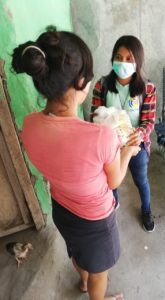
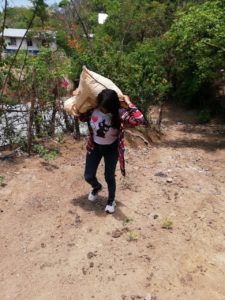
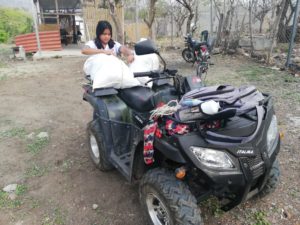
[/imagem_legenda]
De acordo com Saul, o objetivo deles é fornecer assistência humanitária com uma abordagem de direitos humanos, desmantelando os desequilíbrios de poder. “Queremos que as famílias se vejam e aos membros do Coincidir como iguais”, ele afirma.
[image_caption caption=”Uma jovem garota completa um caderno de exercícios entregue pela Coincidir. © Coincidir” float=”alignleft”]
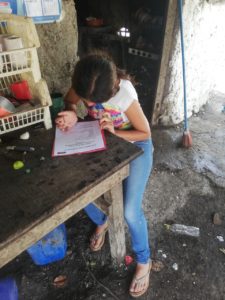 [/imagem_legenda]
[/imagem_legenda]
À medida que a situação evoluiu, as necessidades das comunidades se diversificaram. A Coincidir começou a fornecer absorventes higiênicos para meninas e mulheres jovens, que se tornaram escassos à medida que as comunidades ficaram mais isoladas devido às medidas de confinamento. Como as escolas permanecem fechadas, as meninas também estão criando materiais de treinamento sobre os tópicos que geralmente abordam em suas atividades, incluindo direitos e saúde sexual e reprodutiva, autoestima e prevenção da violência. Eles são entregues junto com os suprimentos básicos de higiene e alimentos, pois a equipe da Coincidir determinou que os guias educacionais enviados pelo Ministério da Educação em vez da escola presencial são deficientes. A Coincidir também começou a desenvolver e distribuir materiais recreativos para adultos, como livros de colorir, mandalas, giz de cera e bordados, para combater o estresse causado pelo confinamento.
[image_caption caption=”Experimentando a nova máscara facial com #LibresyPoderosas impresso nelas. © Coincidir” float=”alignright”]
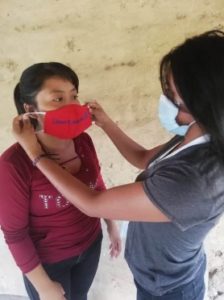 [/imagem_legenda]
[/imagem_legenda]
As líderes femininas também tiveram uma ideia para gerar oportunidades de emprego criando máscaras faciais Coincidir. Elas prepararam frases para incluir nas máscaras – uma delas é #LibresYPoderosas (livre e poderosa), a hashtag da iniciativa Empowering Adolescent Girls criada durante a primeira reunião de parceiros – que foram então impressas em material de tecido. Elas entregaram o tecido às famílias, que recebem pagamento por cada máscara que concluem.
Coincidir é uma das poucas organizações que está indo de porta em porta, fornecendo ajuda e aconselhamento às famílias. Até agora, eles visitaram 250 famílias em comunidades em Jalapa. De acordo com Saul, as famílias ficaram profundamente comovidas com essa expressão de solidariedade. “Você não pode imaginar o quão significativo isso tem sido para as pessoas, indo de porta em porta, perguntando às pessoas como elas estão”, ele compartilha.
Embora a Coincidir tenha cancelado todas as atividades presenciais regulares e a maioria da equipe esteja trabalhando em casa, a decisão da equipe de visitar as famílias de porta em porta, apesar do bloqueio nacional, vem de seu profundo senso de comprometimento com essas comunidades. Eles estão tomando as precauções adequadas, como fornecer à sua equipe equipamentos de proteção e limitar o número de membros da equipe que saem por vez, para tentar evitar a propagação do vírus, sem abandonar as famílias das crianças e jovens que participam de seus programas.
Segundo María José, a Coincidir agora começa a pensar no que vem pela frente. A Coincidir tem um grande terreno no município de San Luis Jilotepeque, Jalapa, onde construiu um centro de treinamento para meninas e mulheres jovens e planeja usar parte da terra para cultivar milho e feijão e, assim, contribuir para a segurança alimentar das famílias da área.
Para visitar a página do Coincidir no Facebook, Clique aqui.
Doe para apoiar crianças afetadas pela pandemia do coronavírus.
